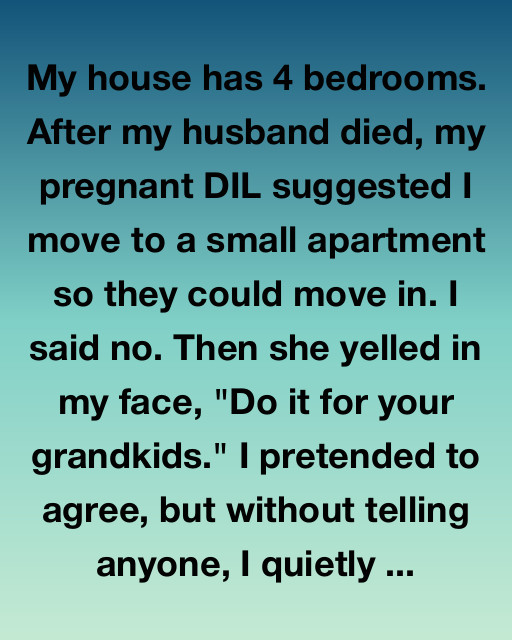Four bedrooms felt cavernous after my husband died. I wandered from room to room like a ghost, touching the piano he’d given me when we were newlyweds, straightening the robe that still smelled like his aftershave, listening for a voice that wouldn’t answer.
Two months after the funeral, my son and his wife stood in my kitchen. Talia wore her best smile—the kind that never reached her eyes.
“We’ve been thinking,” she said. “You don’t need this big place by yourself. We’re starting a family. It just makes sense.”
“I’m not ready,” I told them.
Two weeks later she came back alone, sweetness gone. “Why are you being so selfish? You’d rather die in this house than help your son?”
It stung. I smiled anyway. “You’re right. I’ll move.”
She lit up. “Glad you came to your senses.”
The next morning I went to an attorney. I updated my will, moved the deed into a living trust, and made this address untouchable. Then I did something else.
I started filling the empty rooms.
Mae came first—a retired schoolteacher with two suitcases and a tiny dog named Button. We drank tea and finished crossword puzzles in ink. Ava followed, a 23-year-old nursing student who left little thank-you notes after dinner. Then Luis, a quiet divorcee who repaired the wobbly banister without being asked and one Saturday painted the garden fence a cheerful blue.
The fourth bedroom I kept for my husband’s records. Some nights I’d sit on the floor, blanket around my shoulders, and let his jazz curl through the house again.
People started calling the place a sanctuary. We had dinners and movie nights and holiday decorations that got a little out of hand. For the first time in months, I wasn’t alone. I was chosen.
A year passed. Victor rarely called. When he did, it was brief. Talia didn’t call at all.
Then one evening he left a message. “Can we come by tomorrow? We need to talk.”
They arrived with their six-month-old—soft cheeks, sleepy eyes just like his father’s. They didn’t ask me to sell. They asked to move in.
“Talia’s mom kicked us out,” Victor said. “We just need a place for a while.”
Talia’s smile was suddenly warm again. “You’ve made it so cozy here.”
“I’ve had help,” I said.
“So… is it okay if we stay?” Victor asked.
I looked at the baby. At my son. At the house that had learned to breathe again.
“You can’t move in,” I said gently. “But you can come for dinner.”
Talia blinked. “I’m sorry—what?”
“You’re welcome every Sunday, like before. But this home isn’t a backup plan. It’s a place where people care about each other. Space isn’t the only thing that matters. Respect does too.”
Mae walked in with Button on her hip. Luis followed with groceries. Ava peeked from the hallway, waving. I introduced them, my voice steadier than I felt.
“These are the people who showed me kindness when I had nothing to offer. They don’t live here out of convenience. They live here out of respect.”
Victor’s face crumpled a little. Talia’s eyes went flat. “So strangers matter more to you than your own son?”
“No,” I said. “But love isn’t owed just because we share blood. It’s shown. Earned. Sometimes strangers become family when your own forget how to treat you.”
They left quietly. That night guilt tapped at my shoulder—not because of what I’d said, but because of how tired Victor looked.
Two weeks later I invited just him for lunch. No Talia. He came.
“I forgot how peaceful it is here,” he said over grilled cheese and tomato soup, the same lunch I made when he was ten.
“Thanks for not giving up on me,” he said at the door.
“You’re still my son,” I told him. “I’m just reminding you how to be one.”
He started visiting on Sundays again—first alone, then with the baby. He found a new job. Started therapy. Eventually, he and Talia separated. He told me later, “She didn’t want to change. I couldn’t keep asking you to forgive someone who wasn’t sorry.”
We never said I told you so. Healing doesn’t need that.
Life moved. Ava graduated and moved out, but she still sends postcards. Mae’s niece relocated her closer to family; she left Button with me because I’d “earned him.” Luis stayed the longest, saved enough for a little place of his own, and asked me to bless it before he moved. He built me a birdhouse as a thank-you. It hangs outside the kitchen window, a small burst of color the starlings adore.
Years later the house still has four bedrooms. One is mine. One is a library. One is for guests. The smallest is crammed with toys, finger paintings, and a crib, because every other weekend my granddaughter comes to stay. Victor drops her off and stays for dinner. Sometimes we dance in the kitchen to my husband’s records; sometimes we sit on the porch under blankets, sipping cocoa and naming constellations we only half remember.
The house is full—not of things, but of stories. Laughter. Music. Peace.
I could have moved to keep the peace. Instead, I kept the house and built a different kind. I learned that protecting your peace isn’t selfish—it’s sacred. Generosity is not surrender. You can open your heart without handing over your keys.
If someone tries to push you out of what you love, pause. Breathe. Remember: you’re allowed to say no. The right people—by blood or by luck—will meet that no with respect, and keep showing up for Sunday dinner.


